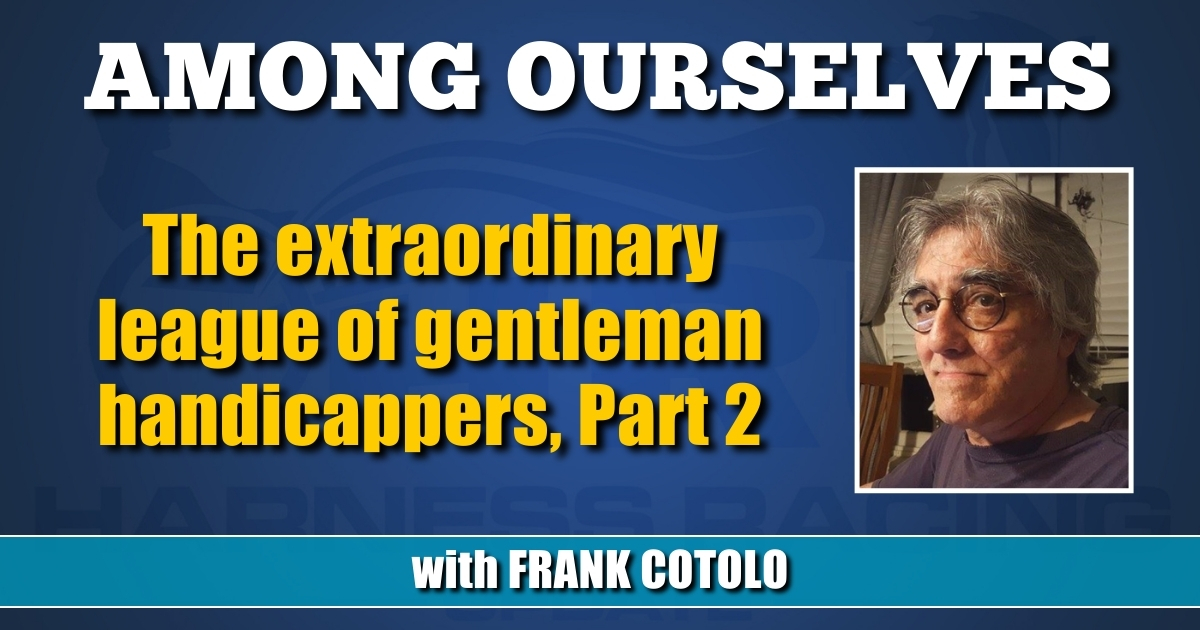The extraordinary league of gentleman handicappers, Part 2
by Frank Cotolo
In 1988, a contingent of my so-called league of gentleman handicappers sat in a single row across the clubhouse grandstand at Hollywood Park. The setting was casual and the gathering social, but I hardly felt I belonged in the company of such professorial caliber. But I was not uncomfortable since these were my contemporaries. I knew some better than others but we all knew of one another in one way or another.
It was the first day in May and the horse racing world focused upon the $786,000 Kentucky Derby and this special community of California handicappers thought the local Los Angeles racetrack the perfect place to experience the event via simulcasting over the racetrack’s jumbotron.
Most of the talk for the Derby concerned a filly named Winning Colors.
“Actually, she is a roan,” said one member of the group.
“Grey with white on the face? That’s not a roan, is it?” said another.
“She was registered a roan,” said yet another.
“Goes to show you what some people know about horses.”
“Color and sex don’t define anything, really,” said one more.
“Neither does registration,” said the third in the row.
And each spoke matters of opinions.
“She’ll be the second filly to win in our lifetime.”
“Genuine Risk.”
“I had that one back then. When was back then?”
“It was 1980.”
“And eight years later?”
“Now? Winning Colors should take this.”
They all shook their heads.
“But is she the bet?”
Then the topic of the Derby ended. They were far more concentrated upon the local racing program because these magnificent craftsmen of pari-mutuel strategies and practices knew valuable wagers would be presented in bulk on the local dirt and turf from horses never to make national headlines and those steeds would contribute to their betting bankrolls. That made the Kentucky Derby a sideshow.
In attendance that day was Dick Mitchell whom I became acquainted with by Mark Cramer. Mitchell taught courses on Microcomputers at L.A. City College. He was a pioneer advocating the use of a personal computer to “beat the races.” His book — A Winning Thoroughbred Strategy (1984, Cynthia Publishing Company, CA) — is bathed in handicapping and betting methods. A bean counter like me was forced to reduce most of the contents to the least common denominators.
It was important at that point for me to accept the wisdom of betting arithmetic from the likes of Mitchell and the other gentlemen thoroughbred players because the pari-mutuel system was blind to breeds. There is a great difference between racehorses that gallop and racehorses that pace or trot but knowledge of both breeds can only make a handicapper better when betting on either. As Mitchell wrote, “The beauty of the approach is that the truth of mathematics is absolute.”
Too many horse-players plead loyalty to one breed or another without sound evidence of supremacy. Pari-mutuel wagering mathematics do not lean in favor of any host game. Sometimes no horses are even involved. Pari-mutuel betting was used for dog racing and even for the human sport of jai alai. But you would never know that in an argument about which game is more of a challenge or more regal than the other. Such arguments are moot. Although there is no damage being loyal to one betting competition or another there is much gained by understanding how to wager in general in order to be successful.
In Mitchell’s book he included a condensed version of his computer program, “The Positive Expectation Handicapper.” Some of it read like this:
10 B$=CHR$(7) 20 DIM CL (20), CW (20), ES (20), FR (20), LS (20), NH$ (20) . . . and my attention span posted 404. Mitchell laughed. He pointed me to the text that James Quinn wrote about Mitchell’s book: “… the concept of mathematical expectation is explained in clear, pedestrian style.”
I did not know Quinn as well as I knew the others but after I attended a seminar that he gave at City College about common bettor peculiarities, there was no doubt in my mind; even if I only qualified to be the court jester for the league of gentleman handicappers I would don the motley outfit complete with cap and bells.
Quinn’s many books address a host of approaches to pari-mutuel participation. Smart ways to win money are handled with aplomb for casual recreational play and deep-diving profit-bombing with a five-digit-and-up bankroll. He addressed the math and the art of handicapping and betting for on-track and off-track activity. And at his seminar he proved he not only understood but could relate to any portrait of a horseplayer.

















